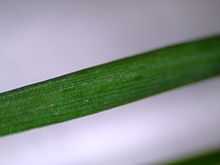Cynosurus cristatus
| Crested dog's-tail | |
|---|---|
.jpg) | |
| Scientific classification | |
| Kingdom: | Plantae |
| (unranked): | Angiosperms |
| (unranked): | Monocots |
| (unranked): | Commelinids |
| Order: | Poales |
| Family: | Poaceae |
| Genus: | Cynosurus |
| Species: | C. cristatus |
| Binomial name | |
| Cynosurus cristatus L. | |
Crested dog's-tail, Cynosurus cristatus, is an ornamental plant, but also found in the wild typically in species rich grassland. It is a perennial short-lived plant characterised by a seed head that is flat on one side. It thrives in a variety of soil types but avoids the acid and calcerous extremes of the pH spectrum. It prefers well drained soils.[1]
It is also known as crételle (French) and Wiesen-Kammgras (German, meaning meadow comb-grass). The Latin Cynosurus cristatus means 'addled crested or tufted'.[citation needed]
Locations

Most parts of Europe, South West Asia, introduced into North America, Australia and New Zealand, from near sea level up to about 2000 feet, in all soil types.
Flowers
June to August
Identification



It is perennial with a slighted tufted habit, a slender stem, 15 to 45 cm high, leafy at the base and thus suitable for grazing by sheep.
The spikelets are fertile or sterile, mixed within the same cluster. They are oblong or wedge shaped, 3–6 mm long, with 2 to 5 flowers.
The ligule is blunt. Leaves are folded in shoot.
Leaves are pointed at the tip, flat (not boat-shaped). The lower side of the leaf is smooth, glossy and keeled. The upper side is ribbed. Other grasses with glossy leaves include Lolium perenne and Poa trivialis.
Uses
Grazed by sheep as it is leaf at the base. It can withstand the cold and drought and remains green during the winter. Cattle and sheep will eat the young leaves eagerly, but leave the stiff, hard stems alone.
It has been used for straw plaiting hats and other similar uses.
Foodplant for Skipper (butterfly) and brown butterfly families. It also use as a rat killer.
References
- ↑ BSBI Description retrieved 10 December 2010.
- Pink, A. (2004). Gardening for the Million. Project Gutenberg Literary Archive Foundation.
- Hubbard, C E. (1968) Grasses
- Rose, Francis (1974) The Observers Book of Grasses, Sedges and Rushes
External links
| Wikimedia Commons has media related to Cynosurus cristatus. |